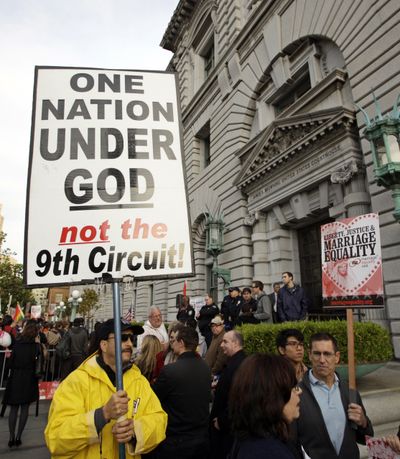Marriage ruling may be narrow
California, Colorado similarities raised

SAN FRANCISCO – Federal appeals court judges Monday seemed headed toward a decision that could reinstate same-sex marriages in California while avoiding a ruling of national sweep that would demand U.S. Supreme Court attention.
The judges indicated at least two routes that could achieve that goal. One would be a ruling that California having granted marriage rights to same-sex couples could not take them away by popular vote. The other would avoid a decision on the constitutional issues by declaring that gay marriage opponents lacked legal standing to appeal a lower court striking down Proposition 8, the 2008 ballot measure that amended the state constitution.
U.S. 9th Circuit Judges Stephen R. Reinhardt and Michael Daly Hawkins, Democratic appointees, suggested that Proposition 8 was similar to a Colorado initiative that repealed anti-discrimination laws against gays and that the U.S. Supreme Court later overturned.
The U.S. Supreme Court struck down the Colorado measure in a landmark 1996 ruling called Romer v. Evans, a major victory for gay-rights advocates. The high court said disapproval of gays was not enough to justify such a measure.
“Isn’t this exactly what the people in Colorado did?” asked Hawkins.
The appeals court is hearing a challenge of an August ruling by Chief U.S. District Judge Vaughn R. Walker, who overturned Proposition 8 after hearing testimony at a trial. Walker’s ruling has been put on hold pending the appeal.
Opponents of same-sex marriage are expected to take the case to the U.S. Supreme Court if they lose in the appeals court. Some legal analysts believe a narrow, limited ruling against Proposition 8 would fare better there than a decision that found gays and lesbians across the country should be entitled to marry.
“Both from the questions about the Colorado case and other questions, it seems like the court is looking for ways it might strike down Proposition 8 without sending the marriage equality question to the U.S. Supreme Court,” said Columbia University law professor Suzanne Goldberg, who was co-counsel in the Colorado case.
Demonstrators from both sides – watched by a heavy police presence – gathered outside the federal courthouse in San Francisco where Monday’s hearing took place.
Inside, the courtroom was packed with lawyers and members of the media, as were overflow rooms.
The dry legal arguments were punctuated at several points with laughter. At one point, for example, Reinhardt told a lawyer that his defense of marriage between a man and a woman sounded more like an argument in favor of prohibiting divorce – something the people of California were unlikely to support.
The battle over Proposition 8 began in the spring of 2008, when the California Supreme Court ruled that the California Constitution prevented discrimination against gays in marriage.